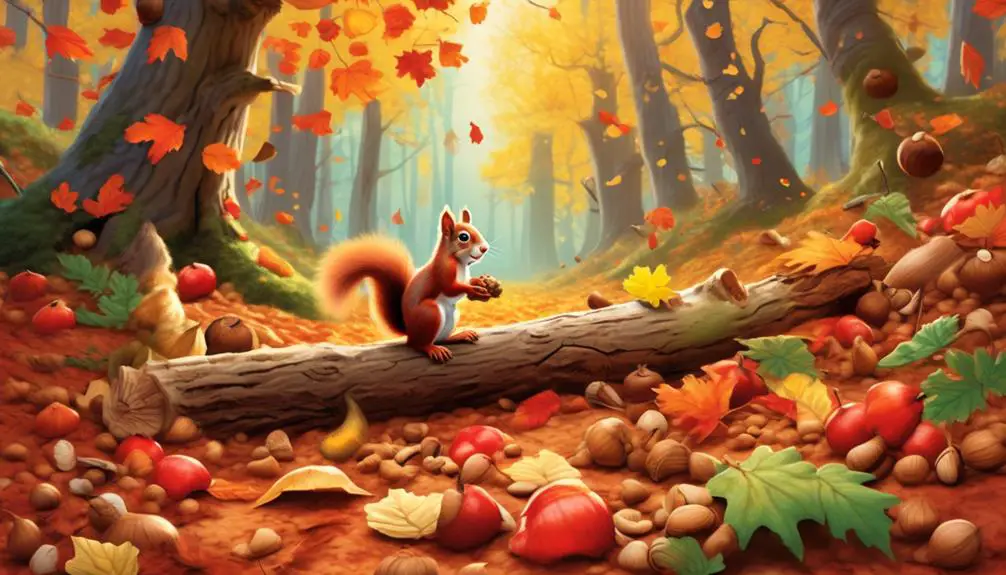Have you ever considered the humble nut as more than just a snack? As you navigate the intricate web of the animal kingdom, you’ll soon realize that nuts hold a special place in the diets of certain creatures.
From the nimble squirrel to the industrious woodpecker, these animals have evolved to thrive on the energy and nutrients provided by nuts. But what is it about nuts that make them so attractive to these creatures? And how do they play a crucial role in their survival?
Join us as we unravel the secrets of animals that eat nuts, and discover the fascinating relationship between these small yet powerful food sources and the creatures that rely on them.
Animals That Eat Peanuts
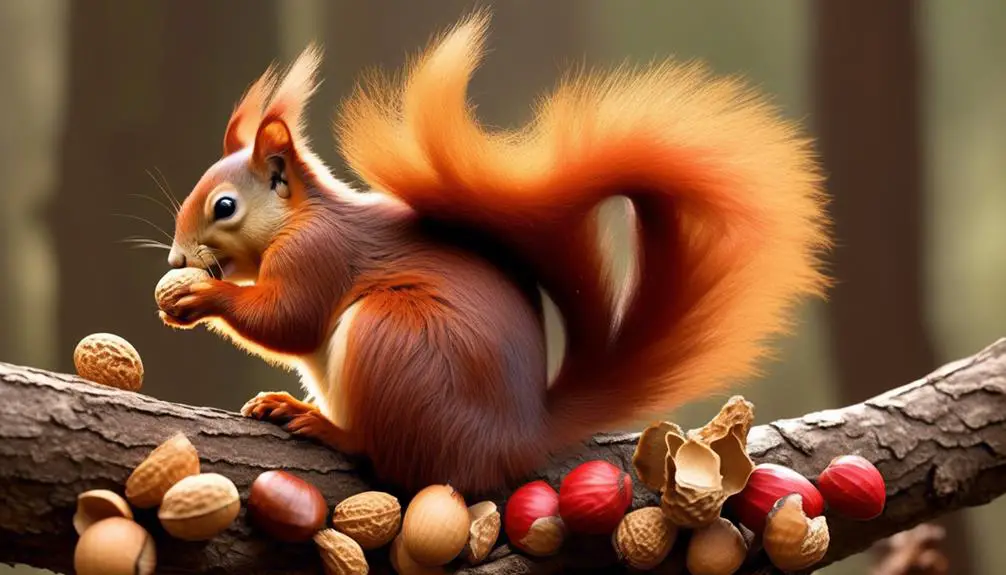
Many animals, such as monkeys, raccoons, squirrels, mice, pigs, woodpeckers, and crows, are known to include peanuts in their diet. Peanuts are a rich source of energy and nutrients for these animals, providing essential fats and proteins. They help maintain a healthy weight and aid in survival during times of scarcity. Some animals, like squirrels, even store peanuts for future consumption. The ability to eat peanuts allows animals to adapt to different environments and thrive.
Peanuts have a high amount of protein compared to other nuts, making them an important dietary choice for animals. They’re also drought-resistant plants and readily available in many parts of the world. For raccoons, peanuts contain necessary fats, carbohydrates, and minerals that contribute to their overall health. Pigs benefit from peanuts as well, as they help strengthen their bones and maintain a healthy weight. Woodpeckers are attracted to peanuts due to their high fat content, which provides them with the necessary energy for their active lifestyles. Crows also find peanuts appealing, as they’re rich in dietary fibers and contain trace minerals that contribute to their well-being.
Cockroaches, Ants, and Rats That Eat Rice
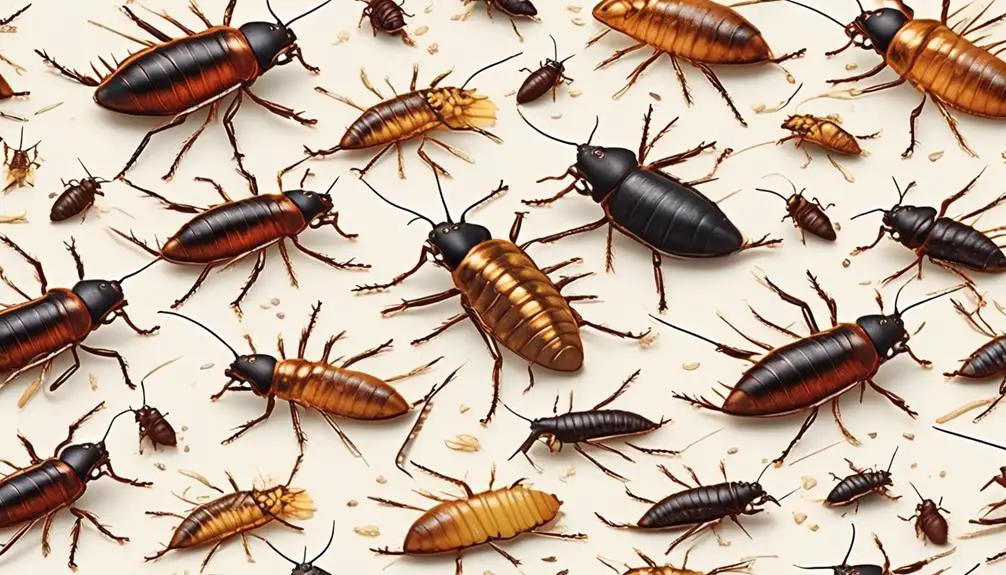
Cockroaches, ants, and rats are known to consume rice due to its attractant properties such as starch and moisture. These insects and rodents are often found in areas where rice is stored or prepared.
Cockroaches are primarily attracted to the starch content of rice, which provides them with a valuable source of energy. They’re also drawn to the moisture present in cooked rice, as it helps to meet their hydration needs.
Ants, on the other hand, are attracted to rice due to its high carbohydrate content. Certain ant species have a preference for rice and will actively seek it out as a food source.
Rats, being opportunistic feeders, are known to consume both cooked and uncooked rice. However, excessive consumption of rice can lead to nutritional imbalances in rats.
Educational Purposes of Animalquarters.Com
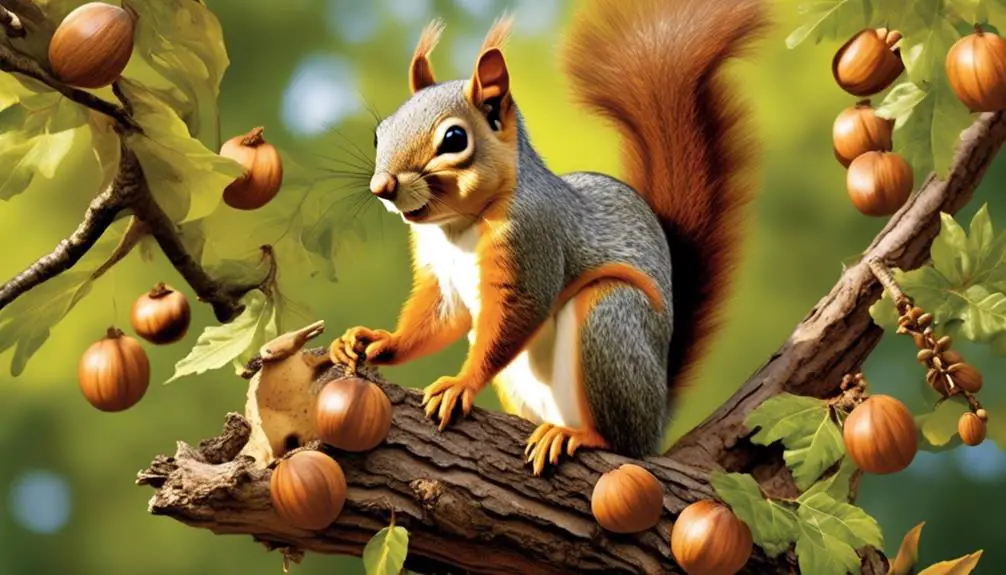
Animalquarters.com serves as a valuable resource for animal enthusiasts seeking educational information about various species. The website aims to provide valuable knowledge about animals and their behaviors, but it’s important to note that it doesn’t offer professional veterinary advice.
While Animalquarters.com offers reliable information, it’s always recommended to consult a veterinarian for specific animal health concerns.
Reliable Animal Information
AnimalQuarters.com, a reliable source of information for animal enthusiasts, aims to provide valuable knowledge about animals and their behaviors. The website serves as a platform for individuals seeking reliable animal information, offering educational content that’s both observational and scientific in nature.
Through careful research and analysis, AnimalQuarters.com presents factual and accurate information about various animal species and their behaviors. It ensures that readers are equipped with reliable knowledge to understand and appreciate the animal kingdom.
The website emphasizes the importance of consulting a veterinarian for specific animal health concerns, as it doesn’t provide professional veterinary advice.
AnimalQuarters.com strives to educate and inform readers, helping them develop a deeper understanding of animals and their behaviors through reliable and trustworthy information.
Importance of Expert Guidance
After gaining a reliable understanding of animal behaviors and knowledge from AnimalQuarters.com, it’s crucial to seek expert guidance to further deepen your understanding of animals and their needs.
Expert guidance plays a vital role in providing accurate and in-depth insights into animal behavior, nutrition, and overall well-being. Professionals in the field, such as veterinarians and animal behaviorists, have extensive training and experience that allows them to interpret animal behaviors and provide tailored advice.
By consulting experts, you can receive personalized recommendations on topics like proper diet, enrichment activities, and healthcare. They can help you navigate through the complexities of animal care, ensuring that you make informed decisions that promote the welfare of the animals you interact with.
Expert guidance is an invaluable resource in expanding your knowledge and enhancing your ability to care for animals.
Animalquarters.Com Disclaimer
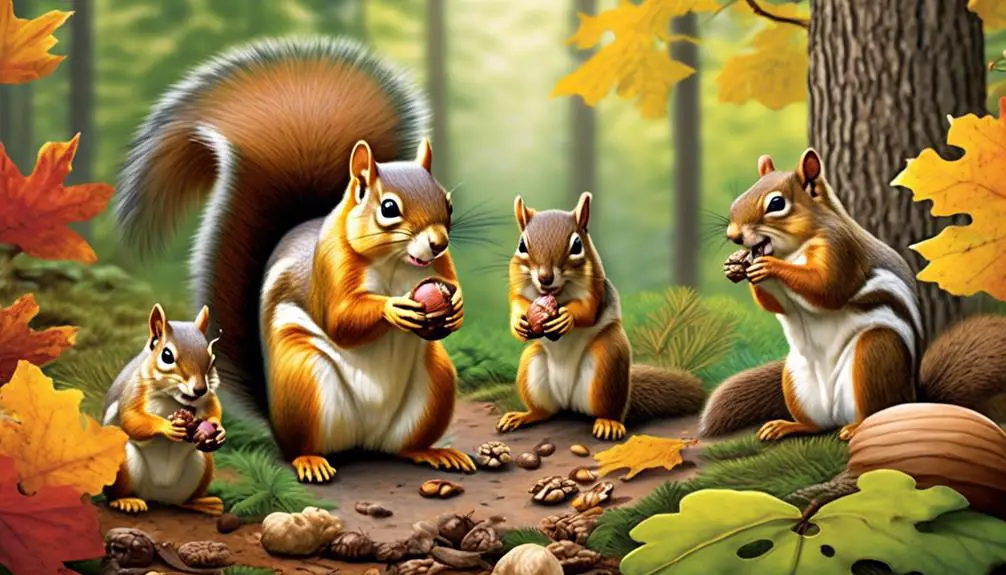
As you delve into the subtopic of ‘Animalquarters.Com Disclaimer’, it’s important to acknowledge the significance of veterinary guidance in animal health. Animalquarters.com aims to educate readers about animals and their behaviors, but it must be emphasized that the website’s information isn’t a substitute for professional veterinary advice.
The responsibility lies with the readers to seek expert guidance from veterinarians and to understand that Animalquarters.com isn’t liable for any actions taken based on its content.
Veterinary Guidance Importance
Seeking expert veterinary guidance is crucial when it comes to ensuring the health and well-being of animals. Veterinarians play a vital role in providing necessary medical care and advice to address the specific needs of animals. They possess the knowledge and expertise to diagnose and treat various health conditions that animals may experience.
Veterinary guidance is especially important when it comes to nut consumption in animals. While nuts can provide valuable energy and nutrients, it’s essential to understand the specific dietary requirements and potential risks associated with nut consumption for different species.
A veterinarian can provide guidance on the appropriate types and amounts of nuts that animals can safely consume, as well as identify any potential allergies or digestive issues that may arise. Consulting a veterinarian is key to ensuring the overall health and well-being of animals that eat nuts.
Educating About Animal Health
AnimalQuarters.com, a reliable source of information for animal enthusiasts, provides valuable knowledge about animals and their behaviors while emphasizing the importance of consulting a veterinarian for specific animal health concerns. It is crucial to educate yourself about animal health to ensure the well-being of your beloved pets. AnimalQuarters.com offers educational resources on various topics, including nutrition, exercise, and preventive care. By understanding the specific health needs of different animals, you can make informed decisions and provide the best care possible. Remember, while AnimalQuarters.com provides valuable information, it is essential to consult a veterinarian for personalized advice. They have the expertise to assess your animal’s health, diagnose any issues, and recommend appropriate treatments. Together, with the guidance of AnimalQuarters.com and veterinary professionals, you can ensure the optimal health and happiness of your animal companions.
| Educational Purposes of AnimalQuarters.com | AnimalQuarters.com Disclaimer |
|---|---|
| – AnimalQuarters.com provides educational information about animals | – AnimalQuarters.com’s information is not a substitute for professional veterinary advice |
| – The website does not provide professional veterinary advice | – The website’s content is not intended to diagnose or treat animal health issues |
| – It aims to offer valuable knowledge about animals and their behaviors | – The website encourages readers to seek expert guidance from veterinarians |
| – AnimalQuarters.com is a reliable source of information for animal enthusiasts | – The primary goal of AnimalQuarters.com is to educate and inform readers about animals |
| – It is important to consult a veterinarian for specific animal health concerns | – AnimalQuarters.com is not responsible for any actions taken based on its content |
Responsibility for Actions
Animal enthusiasts should be aware that AnimalQuarters.com’s disclaimer emphasizes the importance of taking responsibility for one’s actions when using the website’s information. The website provides educational content about animals, but it’s crucial to understand that it isn’t a substitute for professional veterinary advice.
AnimalQuarters.com aims to offer valuable knowledge about animals and their behaviors, serving as a reliable source of information for enthusiasts. However, readers should always consult a veterinarian for specific animal health concerns.
AnimalQuarters.com’s primary goal is to educate and inform readers about animals, but it isn’t responsible for any actions taken based on its content. Therefore, it’s the responsibility of the users to use the information responsibly and seek expert guidance when necessary.
Various Animals That Eat Nuts
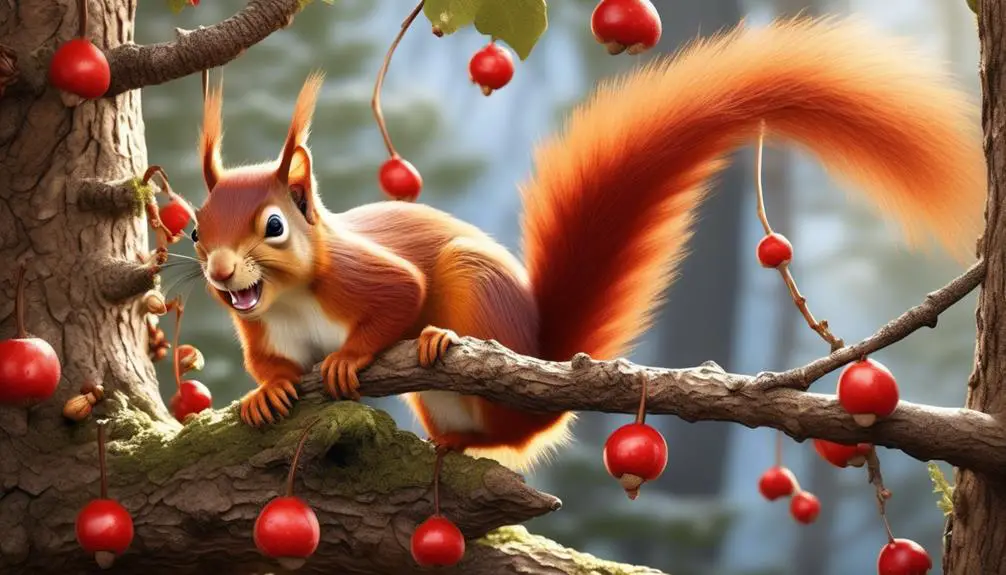
A variety of animals, including squirrels, woodpeckers, jays, monkeys, apes, chipmunks, and mice, have been observed consuming nuts as a significant part of their diet. The table below provides a comprehensive list of various animals that eat nuts:
| Animals | Nut Consumption |
|---|---|
| Squirrels | Squirrels are well-known for their ability to consume nuts. |
| Woodpeckers | Woodpeckers are attracted to nuts due to their high fat content. |
| Jays | Jays have been observed eating various types of nuts. |
| Monkeys | Monkeys are known to include nuts as part of their diet. |
| Apes | Apes, like monkeys, consume nuts as a source of nutrition. |
| Chipmunks | Chipmunks are small mammals that rely on nuts for sustenance. |
| Mice | Mice have been observed consuming nuts in their natural habitat. |
These animals rely on nuts for several reasons. Nuts are a rich source of energy and nutrients, providing essential fats and proteins. Nut consumption helps animals maintain a healthy weight and survive during times of scarcity. Some animals, like squirrels, store nuts for future consumption. The ability to eat nuts allows these animals to adapt to different environments. It is fascinating to observe how various species have evolved to include nuts as a key component of their diet, highlighting the importance of this food source in the animal kingdom.
Importance of Nut Consumption for Animals
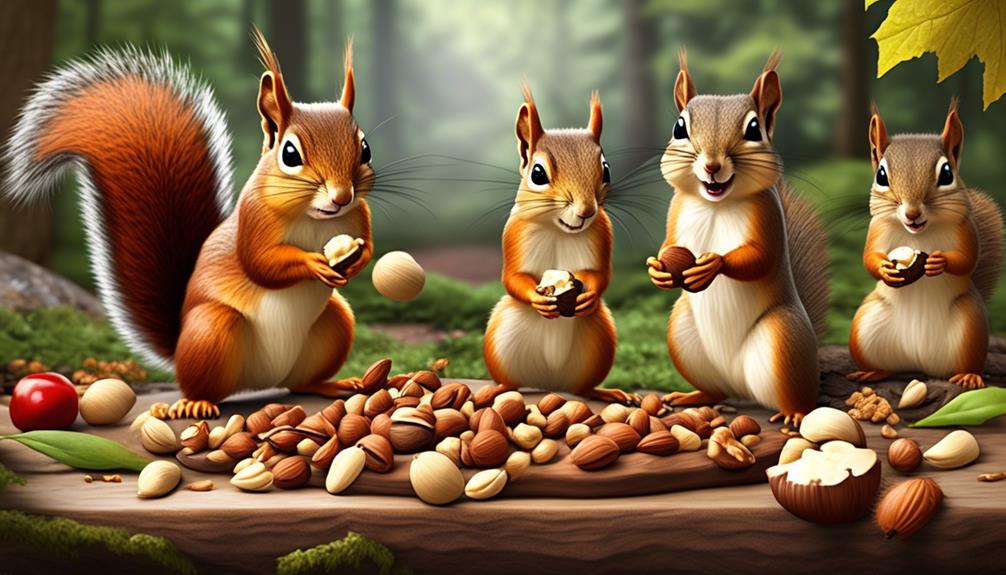
Continuing our exploration of animals that rely on nuts as a significant part of their diet, let’s now delve into the importance of nut consumption for these fascinating creatures.
Nuts provide animals with a rich source of energy and nutrients. They’re packed with essential fats and proteins that are crucial for their overall health and well-being. Nut consumption helps animals maintain a healthy weight and survive during times of scarcity when other food sources may be limited. Some animals, like squirrels, have the ability to store nuts for future consumption, ensuring their survival during lean periods.
The ability to consume nuts allows animals to adapt to different environments. Nuts are a resilient and readily available food source, making them an important part of these animals’ dietary strategies. Peanuts, in particular, are high in protein compared to other nuts, making them an excellent nutritional choice for animals. They’re also drought-resistant plants, making them widely available in many parts of the world. For raccoons, peanuts provide necessary fats, carbohydrates, and minerals that contribute to their overall health.
Furthermore, peanuts help strengthen the bones and maintain the weight of pigs. Woodpeckers are attracted to peanuts due to their high fat content, which provides them with the energy they need for their active lifestyles. Crows benefit from the dietary fibers and trace minerals found in peanuts.
Additional Facts and Points
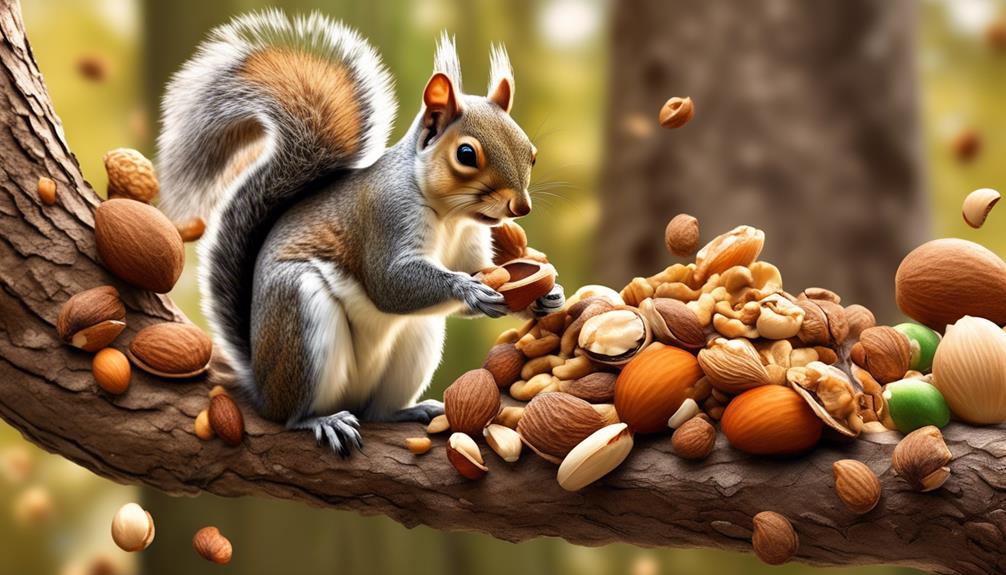
Peanuts, with their high fat content and rich nutritional profile, have attracted the attention of various animals for their valuable dietary benefits. Peanuts are especially favored by raccoons, who benefit from the necessary fats, carbohydrates, and minerals that peanuts provide. These nutrients help raccoons maintain a healthy weight and support their overall well-being.
Additionally, peanuts play a crucial role in strengthening the bones of pigs, ensuring their growth and weight maintenance. Woodpeckers, on the other hand, are drawn to peanuts due to their high fat content, which provides them with the energy they need for their active lifestyles. Furthermore, peanuts are also a valuable food source for crows, as they’re rich in dietary fibers and contain essential trace minerals.
Moving away from peanuts, cockroaches are attracted to rice because of its starch and moisture content. Rice serves as a common food source for certain ant species, while rats can consume both cooked and uncooked rice, but excessive consumption can lead to nutritional imbalances.
These additional facts shed light on the diverse preferences and nutritional benefits of animals that eat nuts.

Erzsebet Frey (Eli Frey) is an ecologist and online entrepreneur with a Master of Science in Ecology from the University of Belgrade. Originally from Serbia, she has lived in Sri Lanka since 2017. Eli has worked internationally in countries like Oman, Brazil, Germany, and Sri Lanka. In 2018, she expanded into SEO and blogging, completing courses from UC Davis and Edinburgh. Eli has founded multiple websites focused on biology, ecology, environmental science, sustainable and simple living, and outdoor activities. She enjoys creating nature and simple living videos on YouTube and participates in speleology, diving, and hiking.
🌿 Explore the Wild Side!
Discover eBooks, guides, templates and stylish wildlife-themed T-shirts, notebooks, scrunchies, bandanas, and tote bags. Perfect for nature lovers and wildlife enthusiasts!
Visit My Shop →
